My family’s association with this Hindu organization and its teachers lifted me from tragedy while inspiring religious education and daily devotion
BY KUMUDHA VENKATESAN, USA
I CRIED LIKE A CHILD FOR MONTHS AFTER the passing of my father in 2013. Suddenly everything came to a standstill for me. My whole life, I had loved, respected and revered him. As I grew up, he taught me math and drawing. We would discuss everything from politics to philosophy, religion and astronomy. He was my role model. I vividly remember his fascination with the perfect creation and management of our universe by Lord Krishna. Always brimming with optimism, he was loving, caring, inspiring and compassionate to everyone. He always performed his duties to the best of his abilities and in full surrender to the Divine.
After traveling to India for the funeral rites with my husband, mother-in-law and son, I returned to the US with a heavy heart. The difficult karma kept coming, and I fractured my right hand on the journey home. For the following few weeks I was overwhelmed with intense pain, sadness and grief. I found myself hating life every morning. My caring mother-in-law and husband cooked food for the family every day for the next two months, while I would sit in my room for hours, staring at a beautiful picture of Lord Krishna, asking, “Why did my father die? Why am I feeling so sad?” Sometimes tears rolled down my face. Engulfed with sadness and anger, I could only nod my head when friends offered condolences. My mother, siblings and cousins in India also tried to console me, to no avail. Soon I no longer felt like praying; I lost interest in my favorite activities, such as listening to music or going for long walks. I was on the verge of becoming an atheist. My husband—my best friend and soulmate—tried to comfort me. He urged me to pray, to recite the Vishnusahasranama and Aditya Hrudayam every day.
Then one day my mother-in-law told us about Chinmaya Mission’s Balavihar—classes on Hinduism for youth, offered on Sundays. She felt my son would get a good exposure to Hinduism there. I didn’t really like the idea, as Sunday was a day of rest and relaxation for our family, but I conceded. Before I knew it, my son began to consider it the best day of his week! He started by learning stories from the Ramayana along with the chanting of several shlokas. That year a local Bhagavad Gita and Upanishad discourse was to be given by Swami Tejomayanada himself, disciple of Swami Chinmayananda and head of the Chinmaya Mission until 2017. The title was Essence of the Bhagavad Gita. Though I resisted, my husband finally coaxed me into attending.
Listening to the enlightening words of Swamiji, I was instantly transported to another world. When Swamiji said, “The human soul is eternal and immortal. Fire and weapons cannot destroy it,” I felt as if I was hearing Lord Krishna Himself. These few words had a profound impact on me and on my depressed state of mind. Listening further, my mind became calm and refreshed. I wanted this divine talk to go on eternally. A state of peace and tranquility persisted long afterwards, uplifting and reenergizing me, rekindling my interest in our ancient scriptures and philosophy. As Swami Vivekananda said, “Super-divine strength is the only way, the one way out. By it alone we can pass through all these intricacies, through these showers of miseries, unscathed.” Here I felt as though that Super-divine had intervened during my life’s darkest period.
Soon I was reading a Gita translation by Pujya Gurudev (Swami Chinmayananda). I wholeheartedly agreed with its wisdom. As with my father, I was learning of karma, dharma (righteousness), virtue, meditation, mantras, and the three gunas: sattva, rajas and tamas. I started to read spiritual books, many by Swami Chinmayananda, absorbing his words, his legacy and his meditative simplicity. By divine grace, I started to follow a more spiritual way of life. I now began my day with a simple puja and at least a ten-minute meditation. I worked to follow Lord Krishna’s sage advice: “Do your duty to the best of your abilities.” As Swami Chinmayananda said, “Start living the divine life. Then yours shall be the daily experience of the blessings of the Lord, even in your simple domestic life.”
Recently my husband and I took part in Swami Iswarananda’s enriching workshop, Life of I: On the Sadhana Trail. Swami expounded Vedanta teachings with numerous interesting stories from everyday life. I was in a state of spiritual bliss when Swami articulately explained how prayer, japa and meditation can take our mind towards purity and goodness.
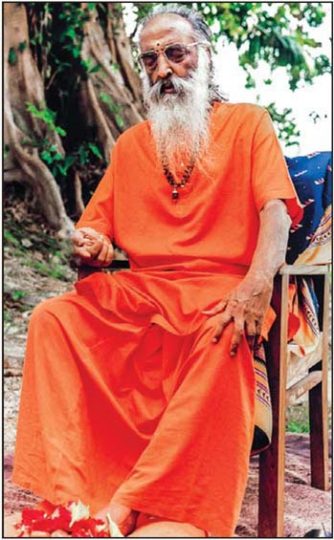
PASSING ON TRADITION: Swami Chinmayananda, founder of Chinmaya Mission
Chinmaya Mission
I’ve heard that when Pujya Gurudev was sitting on banks of Mother Ganga, She told him to spread the knowledge of Vedanta. In 1954, on the power of that vision, he and his devotees founded the religious organization known as Chinmaya Mission. Through numerous spiritual talks, Pujya Gurudev motivated and inspired thousands of Hindus across India and the world to follow the path of dharma in order to eventually attain moksha (freedom from rebirth). Swami Tejomayananda says, “Pujya Gurudev is an infinite goodness, perfectly integrating love, light, devotion and knowledge.” Throughout his life, Pujya Gurudev played a pivotal role in helping to revive the essence of Hinduism in many parts of India after the nation’s freedom from the British. His powerful speeches captivated diplomats at the United Nations, inspired college students in American universities, and created a worldwide movement that runs entirely on volunteer work.
Swami Chinmayananda said, “True religion has two important constituents: its philosophy and its ritual. Ritual without philosophy is only superstition, while philosophy without ritual practices amounts to madness.” The mission’s philosophy is based in Vedanta, or “the conclusion of the Vedas,”—the foundation of Hinduism. Swami Chinmayananda says, “Vedanta is a philosophy; it is a science of life, an art of living, a religion, and much, much more…” Chinmaya Mission works to epitomize Vedic knowledge for everyone, of all ages. The goal is to provide to individuals, from any background, the wisdom of Vedanta and the practical means of spiritual growth and happiness, enabling them to become positive contributors to society. The Mission’s motto is “To give maximum happiness to the maximum number for the maximum time.” Today there are around 500 Chinmaya Mission centers across the world working towards the fulfillment of this mission statement, primarily through its teaching programs, study-groups, spiritual discourses and Hindu family camps.
Swami Swaroopananda currently heads Chinmaya Mission worldwide. He and the many swamis and acharyas continue imparting the eternal knowledge of the Bhagavad Gita and Upanishads to young children, teenagers, adults and seniors, including Westerners who are curious to learn about Vedanta and Hindu culture.
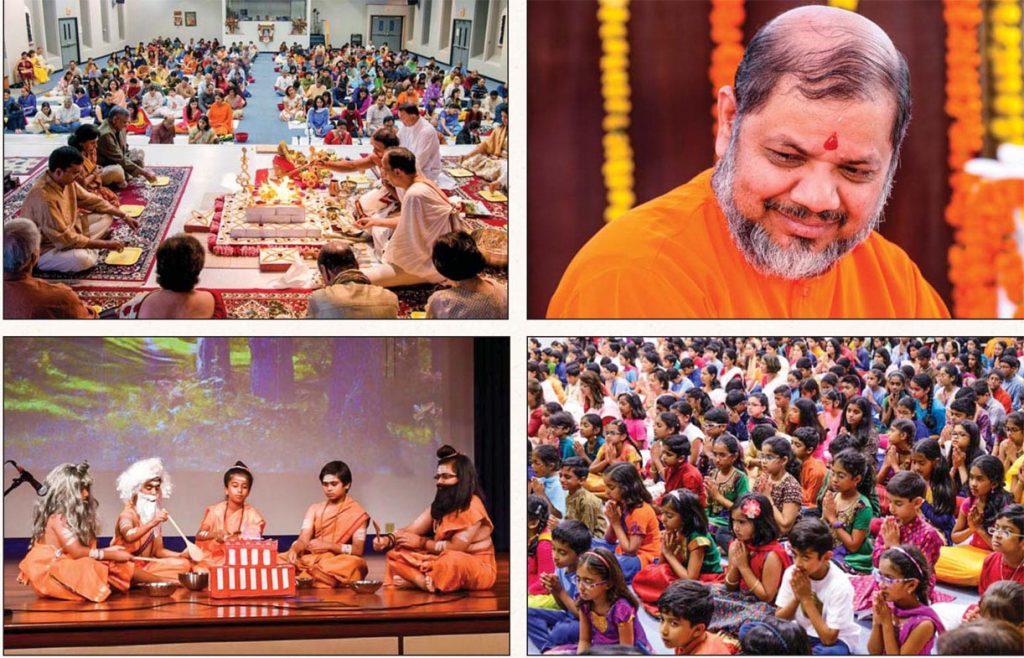
(clockwise from top-left) devotees gather in Houston to celebrate Mahasivaratri; Swami Tejomayananda visits the center in Los Angeles, California; young children assemble before beginning their Balavihar classes for the day; five youth perform a short skit, dressed as sadhus offering worship
Balavihar
For many Indian Americans, Chinmaya Mission is synonymous with Balavihar. Balavihar programs are offered worldwide by the mission’s many centers. Through classrooms, games, arts, crafts, stories and more, the program aims to reinforce spiritual and cultural values for prekindergarten through twelfth grade. Pujya Gurudev was deeply concerned about Hindu children growing up in Western countries. He stated, “Training of our children can be done between the ages of 6 to 12. Between ages 12 to 18, it can be done to an extent, but after 18 the tree has set and one will have to go through fire in order to become hot and pliable enough to change.” He also stated, “Children are not vessels to be filled, but lamps to be lit.” The mission’s youth programs nurture and mold children through devotional bhajans, scriptural learning, cultural crafts and inspiring stories from the Ramayana, Mahabharata and the Puranas.
My son’s attendance at Balavihar each week has had a noticeably positive effect on him. Now he says a few shlokas every day, first thing in the morning and last thing at night. He knows more shlokas and Puranic stories than I do! He has started to meditate for short periods consistently each day and then writes “Sri Rama Jayam” eleven times. He is inspired to learn Sanskrit, and he loves to narrate the moral stories he hears from his Balavihar classes. Now both my son and mother-in-law regularly chant Hanuman Chalisa. In my experience, Chinmaya Mission has been a spiritual platform for steady devotion towards the Divine. Even though we are staying thousands of miles away from India, I feel so fortunate that my son is able to learn about Hindu festivals, culture and traditions here at home.
A core volunteer and fifth-grade Balavihar teacher told me, “Hindu children should enroll in Balavihar because it helps to inculcate the dharmic values in a fun-filled way. Balavihar makes them clearly understand what it means to truly be a Hindu.” Sudha Malhotra, president of our local Chinmaya Mission Alpharetta, told me, “The essence of Balavihar is to build a foundation for imbibing the teachings of Vedanta, to bring about a positive transformation in their lives. It goes beyond learning shlokas and reading interesting stories.”
Parents play an integral role in Balavihar as well. Not only do they themselves often attend classes while their children do (most centers require it), but usually parents will volunteer to be teachers. My husband enjoys being a back-up teacher in my son’s class. This year he is teaching Bhagavad Gita chanting to children. Many adults in our Chinmaya Mission are eager to do service. During special events, such as our annual Krishna Mela, teachers, parents and volunteers spend many hours organizing and coordinating.
Teenagers in 8th grade and above are in Junior Chinmaya Mission Yuva Kendra (CHYK). These teenagers read and discuss interesting books such as Hindu Culture, written by Swami Tejomayanandaji, Self- Unfoldment, written by Pujya Gurudev, and more. Sudha Malhotra says, “Self Unfoldment, for example, is a text that covers all concepts related to Vedanta. The teenagers’ curiosity about life makes our discussions very enriching. With the pressures of high school, these teachings give teenagers a huge edge over others and lay a strong foundation.” These teenagers actively participate in community service by teaching underprivileged children, organizing bake sales, and volunteering at community shelters and old age homes. They also learn more advanced practices such as pranayama and meditation. Sudha Malhotra told me, “Hindu culture enables Balavihar teenagers to gain a deeper understanding of the significance behind the Hindu beliefs and practices. The teenagers also take field trips to churches and mosques to learn about other religions and share about Hinduism. This deepens peoples’ understanding of Hinduism.” A local ninth grader told me, “I love the discussions about Vedanta. They have helped me immensely in facing all types of challenges and issues at school. I also enjoy meditation and silent walks—activities which help me focus on inner positivity.”
Our Favorite Day of the Week
Every Sunday I look forward to our local Chinmaya Mission assembly. After gathering in the main hall, we start by chanting the sacred word “Aum” three times. We then humbly chant the Shanti Mantra and then the profound Guru Stotram to bless us with the spiritual power of the Guru. This is all followed by a minute of peaceful silence. Chinmaya Mission’s pledge is recited by the children, teachers, volunteers and parents. This powerful pledge was spoken out intuitively by Pujya Gurudev. It reads like this:
“We stand as one family, bound to each other with love and respect. We serve as an army, courageous and disciplined, ever ready to fight against all low tendencies and false values within and without us. We live honestly the noble life of sacrifice and service, producing more than what we consume and giving more than what we take. We seek the Lord’s grace to keep us on the path of virtue, courage and wisdom. May Thy grace and blessings flow through us, to the world around us. We believe that the service of our country is the service of the Lord of Lords and devotion to the people is the devotion to the Supreme Self. We know our responsibilities. Give us the ability and courage to fulfill them. Om Tat Sat.”
Swami Mitranandaji says, “The Chinmaya Mission pledge is practical and educative. Your growth is guaranteed if you apply it.”
During these weekly assemblies, a divine atmosphere fills the hall, and I feel so confident about our eternal religion and our rich heritage and tradition. As I see dedicated volunteers and teachers engaged in their selfless work, Pujya Gurudev’s words flash in my mind: “Brood less, smile more and serve all.”
For me, each Sunday is like taking part in satsang. Hearing divine bhajans, seeing the devoted children and the dedicated teachers and volunteers doing their selfless service, all inclines my mind towards noble thoughts and the Divine. For myself and thousands of others, our mission centers are like spiritual oases. Swami Tejomayananda in the book Satsanga says, “Satsang is the greatest blessing. Do not wait for any greater grace from the Lord.” Here, spiritual practices and selfless service go hand in hand.
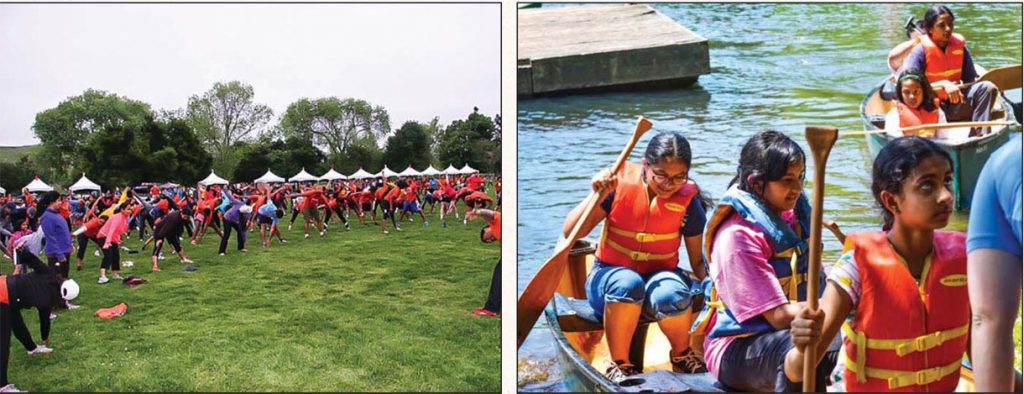
A SPIRITUAL COMMUNITY: Members in San Jose prepare for the “Om Run;” youth camps include many outdoor activities apart from classes, such as canoeing
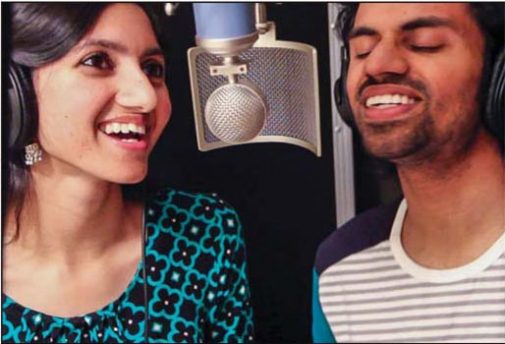
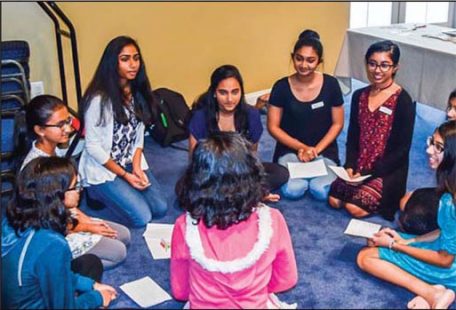
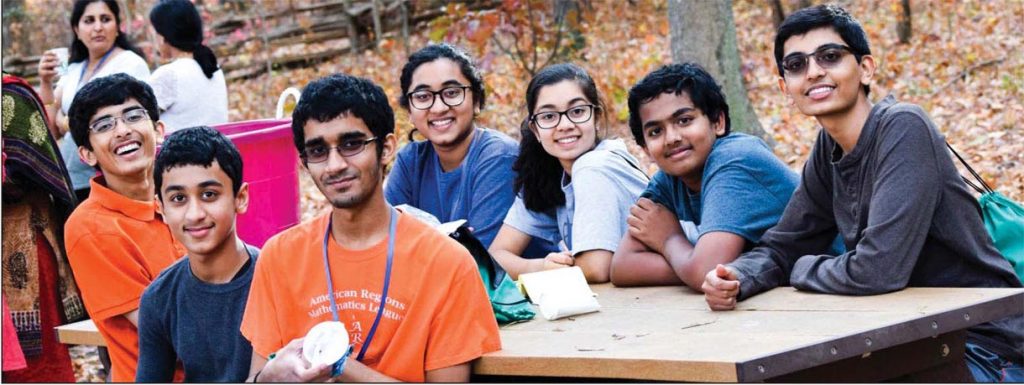
Other Programs
Chinmaya Mission centers worldwide also offer a vast variety of programs and events, such as camps for youth, walkathons, music and language learning, rural development programs and more. The aforementioned CHYK program offers retreats, summer camps and motivational talks by eminent scholars and acharyas. It acts as a great way to harness the huge potential of energetic young adults and direct it towards their religious lives. Recently, in our Chinmaya Mission, Junior CHYK presented “Yuva Connect” where teenagers discussed everything from stress to social media and from meditation to drug addiction. Numerous Hindu children who are not part of Balavihar also participated in this thought-provoking seminar.
The Youth Empowerment Program (YEP) is another such initiative, providing those between ages 18 to 28 an opportunity to serve others for one year, working with downtrodden communities in education, agriculture and infrastructure. Also, the Chinmaya Organization for Rural Development (CORD) is empowering underprivileged communities in India and Sri Lanka by providing roads, constructing schools and helping the areas of agriculture, education, healthcare and sanitation. Swami Tejomayananda says, “CORD is a bond of love and understanding, encouraging a process of sharing which enriches both the giver and the receiver.” Yuva Rhythms, a group of highly talented singers, is creating new music styles to enthrall children and adults with devotional songs, stotras and bhajans. Recently Yuva Rhythms sang beautiful divine bhajans and songs incorporating traditional and Western music in our local Chinmaya Gurukul, enticing Indian-American children to learn more traditional music and shlokas.
There are also many programs to nourish Indian languages, traditions and culture. In our local center children learn Kannada, Tamil, Telugu, Bengali, Marathi, Gujarati, Hindi or Sanskrit. They regularly perform songs in these languages to showcase their education. Traditional dances such as Kathak and Kuchupudi are also taught, as well as yoga for youth and adults. In 2017 Chinmaya Vishwavidyapeeth was started in India, integrating modern education with ancient Hindu traditions and Vedic culture. Youth can graduate in Sanskrit, Indic traditions and Indian Performing Arts. Chinmaya Naada Bindu (CNB) offers long-term and short-term study in traditional Indian music and dance. It teaches tabla, Bharatanatyam, and Hindustani flute in serene foothills at Chinmaya Viboothi near Pune, in India. Chinmaya Mission’s informative television series, Upanishad Ganga, delves into Vedic teachings in the form of engaging stories.
Thanks to the Internet, we can instantly connect to our teachings. I listen to Pujya Guruji’s, Swami Iswaranandaji’s and Swami Abhedanandaji’s inspiring talks on YouTube. My sister, a busy mother in Bengaluru, listens to Swami Iswaranandaji’s talk on the Bhagavad Gita each week. Pujya Guruji regularly conducts e-satsangs so spiritually inclined Hindus across the world can gain eternal knowledge. The “ChinmayaChannel” on YouTube regularly uploads videos of spiritual talks and interviews.
By the Divine grace, my life has changed for the better after my association with Chinmaya Mission and its swamis and members. A few years ago, I was always in a hurry to finish my everyday work. My stovetop was always messy with spill-over, and burnt pots and pans were a staple in my kitchen. After I started traveling on this spiritual path, my kitchen is much cleaner and I’m constantly thinking about Lord Krishna while I’m chopping vegetables and cooking, and sometimes I repeat my favorite mantra, “Om Namo Bhagavate Vasudevaya.” It’s interesting to observe the changes in myself.
Years ago, shopping gave me immense pleasure, but now I only buy things that are absolutely necessary. Listening to spiritual talks, preforming meditation and volunteering gives me solace, while learning from the Upanishads and reflecting on their wisdom has become an integral part of my daily life. I feel I have become more tolerant, compassionate, calm and confident. As Swami Chinmayananda said, “Silently hear everyone. Accept what is good. Reject and forget what is not. This is intelligent living.” I no longer get angry, annoyed or disturbed when I encounter unpleasant conversations and situations in life. I also notice that I no longer have strong likes and dislikes. Now, like my father, I try to do my best in everything and leave the rest to the Divine.
